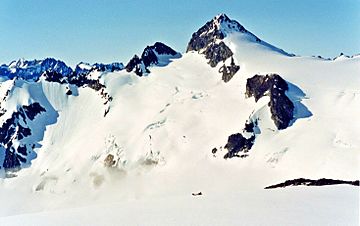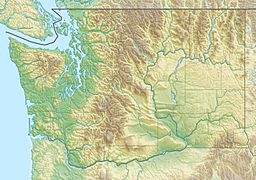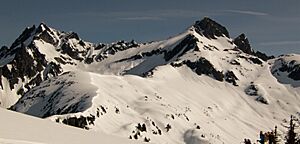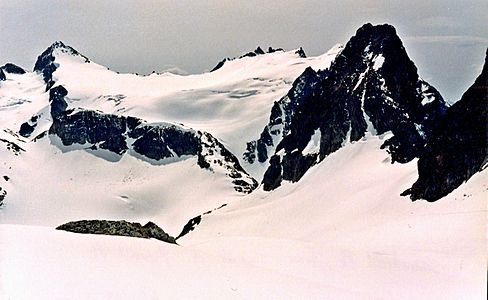Snowfield Peak facts for kids
Quick facts for kids Snowfield Peak |
|
|---|---|

Snowfield Peak seen from Neve Peak
|
|
| Highest point | |
| Elevation | 8,351 ft (2,545 m) |
| Prominence | 2,907 ft (886 m) |
| Geography | |
| Location | Skagit County, Washington, U.S. |
| Parent range | Cascade Range |
| Topo map | USGS Diablo Dam |
Snowfield Peak is a tall mountain, standing at 8,351 feet (2,545 m) (about 2,545 meters) high. It's found in North Cascades National Park in the state of Washington, USA. This peak is located in the southern part of the park. It's about .70 mi (1.13 km) east of another peak called Horsemans Pack. A large ice river, the Neve Glacier, flows down from the mountain's northern side.
Mountain Weather
Snowfield Peak is in a special climate zone called the marine west coast climate. This means it gets a lot of moisture from the Pacific Ocean. Most weather fronts, which are like big air masses, start over the Pacific. They then travel northeast towards the Cascade Mountains.
When these weather fronts hit the tall peaks of the North Cascades, they are forced to rise. As the air goes higher, it cools down and drops its moisture. This creates a lot of rain or snowfall on the mountains. Because of this, the western side of the North Cascades gets a lot of precipitation, especially in winter.
The climate here is mild because it's close to the ocean. Temperatures rarely go below 0 °F (−18 °C) (which is -18°C) or above 80 °F (27 °C) (which is 27°C). Winters are usually cloudy. But in summer, high-pressure systems over the Pacific Ocean often bring clear skies. The snow here tends to be wet and heavy. This can lead to a high risk of avalanches, which are dangerous slides of snow down a mountain.
How the Mountains Formed
The North Cascades area has very rugged land. You can see sharp peaks, long ridges, and deep valleys carved by glaciers. These amazing shapes were created by geological events that happened millions of years ago. These events also caused big changes in elevation, which led to the different climates we see today.
The Cascade Mountains started forming millions of years ago, during a time called the late Eocene Epoch. This happened because the North American Plate (a huge piece of Earth's crust) was slowly moving over the Pacific Plate. This movement caused many volcanic eruptions. Also, small pieces of Earth's crust, called terranes, came together to form the North Cascades about 50 million years ago.
Later, during the Pleistocene period (which started over two million years ago), huge sheets of ice called glaciers moved across the land many times. As they moved, they scraped away rock and left behind debris. The U-shaped valleys you see today were carved out by these glaciers. The main forces that created the tall peaks and deep valleys of the North Cascades are uplift (when land is pushed up) and faulting (when rocks break and slide), combined with the powerful action of glaciers.
Gallery
-
Snowfield Peak (right), with Distal Phalanx, Mantis Peak, and Styloid Peak
 | Stephanie Wilson |
 | Charles Bolden |
 | Ronald McNair |
 | Frederick D. Gregory |






